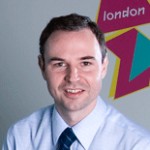Jeremy got his first taste of business helping to run Eurocamp in France during the holidays at university. He tells of about his time working to help make the Olympics happen.
Where and what did you study?
I studied at the University of Newcastle upon Tyne completing a degree in Geography (focusing on human and economic geography).
Did you do any work experience while you studied?
I worked for Eurocamp plc during university holidays, helping to run campsites in France. Each campsite is like a mini business, which exposed me to all aspects of running a successful venture from customer relations to balancing the books.
Why did you choose management accountancy?
Making money is at the centre of most companies and effective management of it is critical to achieving success. Management accountancy gives you a great position, working with both finance and senior management. I didn’t want to be a pure number cruncher – I wanted to be involved at different levels, from strategy to detailed analysis and most importantly take and shape decisions.
What does the Olympic Delivery Authority do and why is it a good place to work?
The Olympic Delivery Authority (ODA) is the public body responsible for developing and building the new venues and infrastructure for the 2012 Games and their use post 2012.
I love just about every type of sport and it’s great to be at the centre of the planning for the two biggest sporting events on the planet – the Olympic Games, which are followed by the Paralympic Games. Also, now and again you get to meet sports stars who pop into the office (Daley Thompson jumped on a desk and told us all to work harder!).
How did you get your job there?
On Wednesday 6th July 2005, I was working at Transport for London. We gathered around a TV to watch the IOC president, Jacques Rogge, announce that the London 2012 team had won the bid to host the 2012 Games for the UK. As soon as I got back to my desk, I got on the net surfing for jobs with the Olympics. Although the ODA had not been formed, an Olympic Transport Team had been formed in TfL to get a head start on planning for the 2012 Games. I was lucky enough to get in early as the company started to ramp up.
What does your job involve?
I am responsible for managing the Olympic transport budget. This involves everything from strategic budget planning, to setting and monitoring budgets, reporting progress, and paying our suppliers on time.
Is there a lot of pressure being involved in such a high-profile project as the Olympics?
There is lots of pressure. I am responsible for managing hundreds of millions of taxpayers’ money and consequently there is huge government and media scrutiny. Almost all jobs come with pressure – It is definitely a positive because it makes you raise your game.
What’s the best thing about your job?
It’s the chance to work on something that is so unique, the most exciting project in the world, in what I consider to be the most dynamic city in the world. Plus it’s really making a difference in the history archives – not just the 2012 Games themselves, but the regeneration of Stratford and East London as well. Perhaps the best thing is that the two things we are working on are so tangible – a fantastic 2012 Games and the regeneration of a massive area of London.
Can you recall the most satisfying moment in your career so far?
Establishing and agreeing the baseline budget for Olympic Transport with government. It is obviously crucial to have clarity on where you are starting from and how much money you have to spend.
What’s the most challenging part of the job?
Delivering the transport needed for London 2012 is a massive challenge. We need to ensure safe, reliable and accessible transport for 500,000 spectators daily from the UK and overseas, as well as the 50,000 athletes, officials, and media we will host in 2012. As you can imagine it is a complex and fast-moving project dealing with a large number of stakeholders; the sheer scale of the task is the challenge.
Our role in the Transport Team is to ensure that spectators to the 2012 Games have excellent journeys by public transport to and from all venues they should get home saying ‘Why can’t it always be like that?!’.
What else would you like to achieve in your role?
Obviously, I would like to successfully deliver all the objectives to achieve a great 2012 Games and provide a lasting legacy in East London. On a personal note, I need to continue on making myself marketable because I am going to need a job in 2012.
How do you keep informed of the changes in the industry?
Mainly through continued professional development (courses, seminars, etc) and via the Chartered Institute of Management Accountants official channels (website and magazine).
Have you taken any professional qualifications?
I qualified as a Chartered Management Accountant in 2006. There are two massive benefits. Firstly, the training and exams give you the confidence to apply your hard earned professional knowledge in the workplace. Secondly, people tend to give professional qualifications respect and it helps you get involved in different projects and build a portfolio of experience.
Has working in this industry lived up to your initial expectations?
Yes. I have been involved in finance in the transport industry for six years at a time when there has been massive investment and change. It is an industry that I did not think of at university, but one that I am glad to be part of.
What’s the biggest myth about the job?
That accountancy is dull. The new breed of management accountant needs to have a wide variety of skills and flexible to adapt. There is certainly nothing dull about being close to the money and the power.
What qualities do you need to survive?
You need to be quick thinking, able to adapt to different situations, and meet the requirements (and expectations) of all your customers – time and time again.
Any advice for graduates wanting to get into the industry?
Obviously, relevant work experience or studies will greatly help you into the industry. Also an understanding of the key issues facing the industry will help convince potential employers you are a serious candidate.




